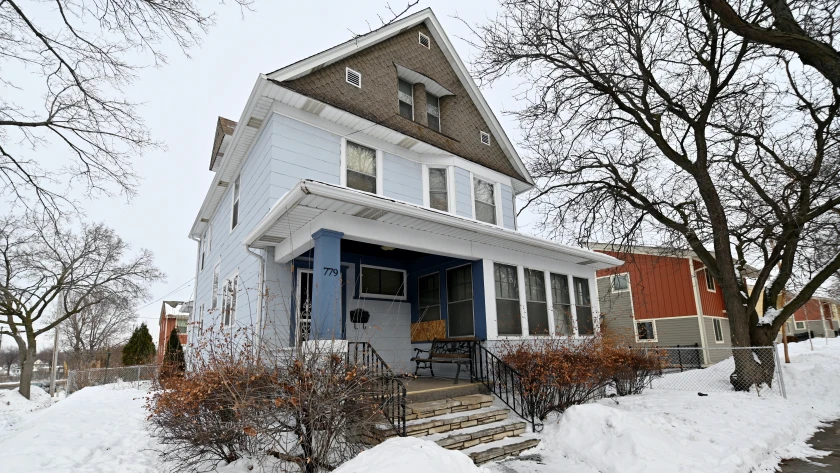Republished with permission from Governing, by Carl Smith
In Brief:
- Homeownership is the primary source of wealth accumulation for most Americans.
- Homeownership rates for Black families have remained significantly lower than overall rates for decades, and 30 points lower than for white families.
- St. Paul, Minn., is one of a group of cities taking part in a 10-year initiative to change that, and to create a climate of equitable access to homeownership and business opportunity.
The nearly 30-point gap between the share of Black and white families who own their homes has not changed over the past two decades. The disparities in St. Paul, Minn., are especially stark. About 15 percent of Black families are homeowners there, as compared to 61 percent of white families. Mayor Melvin Carter knows that has to change, and he has found fresh leverage through a new initiative.
St. Paul is one of several cities participating in the Closing the Gaps (CTG) Network from the nonprofit Living Cities. The cities are working both independently and collaboratively to develop policies and practices that can end racial gaps in wealth and income in their communities.
As a down payment on these efforts, Carter has introduced an Inheritance Fund offering down payment and home rehab assistance to descendants of residents of Rondo, a historically Black neighborhood whose residents were displaced to make room for a highway construction project. “The decimation of Old Rondo destroyed somewhere in the neighborhood of $150 million in wealth in our African American community,” says Carter. “We’re chipping in $1 million, $2 million at a time as we can to facilitate the re-establishment of those family inheritances.”
The median wealth of American homeowners is more than 30 times greater than that of renters. Almost 60 percent of their wealth is home equity. Owning a home opens doors to credit and investment opportunities. Home equity can be an essential source of resilience in emergencies or a foundation for resources passed from generation to generation. Communities are weaker when some are shut out from these opportunities, but a legacy of discrimination against Black Americans who want them has been hard to shake.
The 2020 murder of George Floyd in St. Paul’s sister city, Minneapolis, sparked a protest movement that spread across the country and the world. A Justice Department investigation concluded that the treatment of Floyd reflected a pattern of behavior by police that deprived citizens of their constitutional rights and the protections of federal law. Even so, Minneapolis has retained its reputation as one of the most liberal cities in the country.
These conflicting realities exemplify how hard it can be to confront deeply entrenched racism. Not “racism” as overt harassment, attacks or name calling, but the quiet and consistent denial of opportunity to certain people based on their color or culture. The CTG Network aims to help end the influence of present and historical dynamics on access to homeownership and economic opportunity, drawing on lessons learned from community development programs that have been ongoing for decades.
Reality, Not Rhetoric
Living Cities, a philanthropy funded by 19 of America’s largest financial institutions and foundations, was born out of the National Community Development Initiative (NCDI), founded in 1991 to make capital available to local community development corporations. Over several funding rounds, NCDI invested hundreds of millions of dollars in cities. Living Cities was founded in 2001 to continue and expand this work.
Its strategies continued to evolve, encompassing cross-sector and systems-based approaches to community development. Through a series of initiatives, including a task force focused on race in U.S. cities, it began to organize its work more and more around racial equity and the necessity for economic development efforts to make ending income and wealth inequity a priority.
The death of George Floyd pushed concerns that had been building at Living Cities firmly into the forefront, says Joe Scantlebury, the nonprofit’s president and CEO. The shock of the event was intensified by the fact that members were stuck at home due to COVID-19 restrictions. “We couldn’t not see it,” says Scantlebury. “We said, 'We’re better than this.'”
The CTG Network is made up of 22 cities that “share a vision for what a racially equitable, just and prosperous society can look like.” Six of them were selected to work in the current cohort. Both Twin Cities are part of the cohort, along with Rochester, N.Y.; Austin, Texas; Memphis, Tenn.; and Albuquerque, N.M. They began with a “Year of Reckoning” in 2020 that included detailed needs assessments in each city by the research consultant FSG, in combination with quantitative data from the Urban Institute. In 2023, Living Cities awarded $3.2 million to CTG member cities, some of which bolstered St. Paul’s contributions to its Inheritance Fund.
Living Cities asks governments to look deeply and dispassionately for policies and practices that deny opportunity on the basis of race, recognize them for what they are, and develop more just policies and practices. Scantlebury says he’s politically “agnostic,” interested only in what a leader plans to do to make life better for a city’s urban population.

A house on Carroll Avenue in St. Paul's Rondo neighborhood sits empty while on the market. Research by an independent consultant found discrimination in home appraisals, and realtors discouraging purchases in certain neighborhoods, perpetuating disinvestment. (John Autey/TNS)
Inclusive Economics
Mayor Carter aims to facilitate homeownership in ways that others have never “considered or imagined.” This is a first step toward his goal of making his city “the inclusive economic capital of the world.” Applications for forgivable down payment loans up to $100,000 from the Inheritance Fund are currently closed after high demand exhausted available funds, the result in large measure of residents sharing the news among each other. The city is also exploring other concepts, such as giving low-income renters the opportunity to jointly purchase the multifamily housing they live in. A community land trust has been established in the city, an approach that opens the door to affordable housing but has diminished appeal to some because the fact that they don’t own the land their homes sit on significantly reduces equity accumulation.
Cities in the CTG Network are also confronting the lingering effects of past discrimination. Redlining may be long outlawed, but the needs assessment conducted for St. Paul found that mortgage applications by Black residents are still more likely to be denied — and not because of differences in the data in them. It found discrimination in home appraisals, and realtors discouraging purchases in certain neighborhoods, perpetuating disinvestment. Low-income renters have difficulty building the kind of credit history that is the default for lenders.
Getting residents over the hump of homeownership will move them upstream, better able to share in the equity economy Mayor Carter wants to build, with open access to entrepreneurship opportunities as well as better wages. “We wouldn’t be able to do that without support from Living Cities,” he says.
Being Overwhelmed Is the Goal
Systemic inequalities, not lack of ability, have deprived communities of opportunities to build wealth through both home and business ownership, Scantlebury says. He’s encouraged to see city leaders in red, blue and purple states recognize that and approach economic development by investing in people. Living Cities wants its support to help cities engage with their communities and learn from them what kinds of programs are needed for these kinds of investments to succeed.
Austin, Rochester and other CTG cities are developing their own approaches to equitable access to homeownership, says LaKeeshia Fox, associate director for strategy at Living Cities. The goal is to share what they learn over the next 10 years on an ongoing basis, through ongoing collaboration that fosters collective action. “We’re all doing this work, but we’re not really communicating,” Fox says. “We can do so much more together than we can ever accomplish apart.”
Living Cities has its eyes on extending its assistance beyond the current CTG member cities. “We want to have a floodgate problem,” Scantlebury says. “We really want to have a problem where leaders say we saw what you did and we want to be part of it.”

Governing
Governing: The Future of States and Localities takes on the question of what state and local government looks like in a world of rapidly advancing technology. Governing is a resource for elected and appointed officials and other public leaders who are looking for smart insights and a forum to better understand and manage through this era of change.
